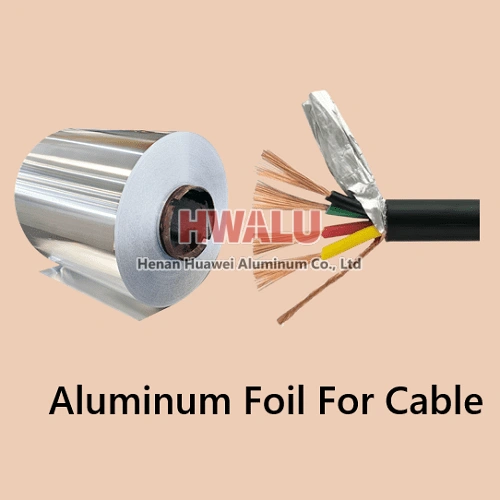What is cable aluminum foil? Cable aluminum foil is a special type of aluminum foil used for cable structures. It is processed from aluminum alloy raw materials through cold rolling, hot rolling and other processes. Aluminum foil used in cables has excellent electrical conductivity and good corrosion resistance, especially in the telecommunications and electrical industries, playing an important role. 8011 ...
What is Aluminum Foil? Aluminum Foil Roll Aluminum foil roll for aluminum foil refers to a raw material used to produce aluminum foil, usually an aluminum foil roll with a certain width and length. Aluminum foil is a very thin aluminum material, its thickness is usually between 0.005 mm and 0.2 mm, and it has good electrical and thermal conductivity and corrosion resistance. Aluminum foil jumbo rolling Aluminu ...
What is aluminum foil for containers? Aluminum foil for containers is a type of aluminum foil specially designed for food packaging and storage. It is commonly used to make disposable food containers, trays, and pans for easy transport and for cooking, baking, and serving food. Aluminum foil for containers, often called aluminum food containers or aluminum foil food trays, is designed to meet specific requ ...
What is aluminum foil for cake cup? Aluminum foil can be used for many purposes in baking, such as making cupcake cups or liners. Aluminum foil cake cups are cup-shaped containers used for baking cakes, cupcakes, or cupcakes, usually made of aluminum foil. Cake cup aluminum foil is used to wrap the bottom and sides of the cake cup to maintain the shape of the cake when baking, prevent sticking, and make the ca ...
What is Thin Aluminum Foil? Thin aluminum foil is a very thin aluminum material, usually between 0.006mm and 0.2mm. Thin aluminum foil can be manufactured through a process of rolling and stretching, which allows it to be very thin without sacrificing strength and durability. It also has some other advantages such as high electrical conductivity, thermal insulation, corrosion resistance, easy cleaning, etc. ...
8011 aluminum foil is a common aluminum alloy material, which has received extensive attention and application due to its good performance and wide application fields. Below, we will introduce the characteristics and advantages of 8011 aluminum foil from various aspects. First of all, 8011 aluminum foil has excellent corrosion resistance. Aluminum foil itself has good oxidation resistance, and 8011 aluminum fo ...
What is the difference between aluminum foil and tin foil? Can it be used for oven heating? Is aluminum foil toxic when heated? 1. Different properties: Aluminum foil paper is made of metal aluminum or aluminum alloy through rolling equipment, and the thickness is less than 0.025mm. Tin foil is made of metal tin through rolling equipment. 2. The melting point is different: the melting point of aluminum foil ...
Aluminum foil is typically thinner than aluminum coil. Aluminum foil is typically available in various thicknesses, ranging from as thin as 0.005 mm (5 microns) up to 0.2 mm (200 microns). The most commonly used thicknesses for household aluminum foil are around 0.016 mm (16 microns) to 0.024 mm (24 microns). It is commonly used for packaging, cooking, and other household purposes. On the other hand, alumin ...
Coiling defects mainly refer to loose, layer channeling, tower shape, warping and so on. Aluminum foil roll during the winding process. Because the tension of aluminum foil is limited, enough tension is the condition to form a certain tension gradient. Therefore, the winding quality ultimately depends on good shape, reasonable process parameters and suitable precision sleeve. It is ideal to obtain tight coils ...
In the production of double foil, the rolling of aluminum foil is divided into three processes: rough rolling, intermediate rolling, and finishing rolling. From a technological point of view, it can be roughly divided from the thickness of the rolling exit. The general method is that the exit thickness is greater than Or equal to 0.05mm is rough rolling, the exit thickness is between 0.013 and 0.05 is intermediat ...
Aluminum foil has the following advantages in food packaging: Barrier property. Aluminum foil has excellent resistance to water, air (oxygen), light, and microorganisms, which are important factors in food spoilage. Therefore, aluminum foil has a good protective effect on food. Easy processing. Aluminum has a low melting point, good heat sealing, and easy molding. Can be processed into any shape according to ...







